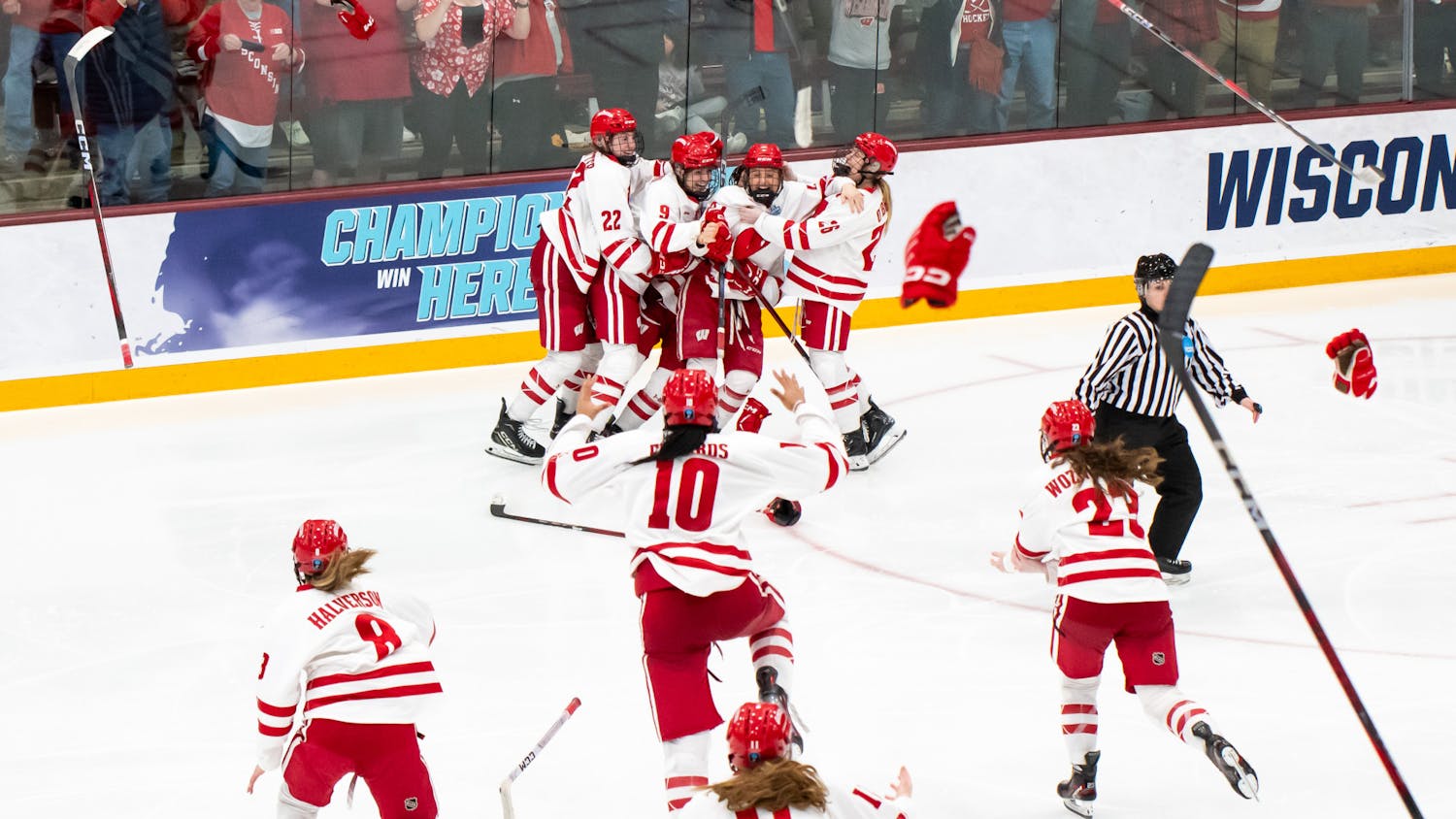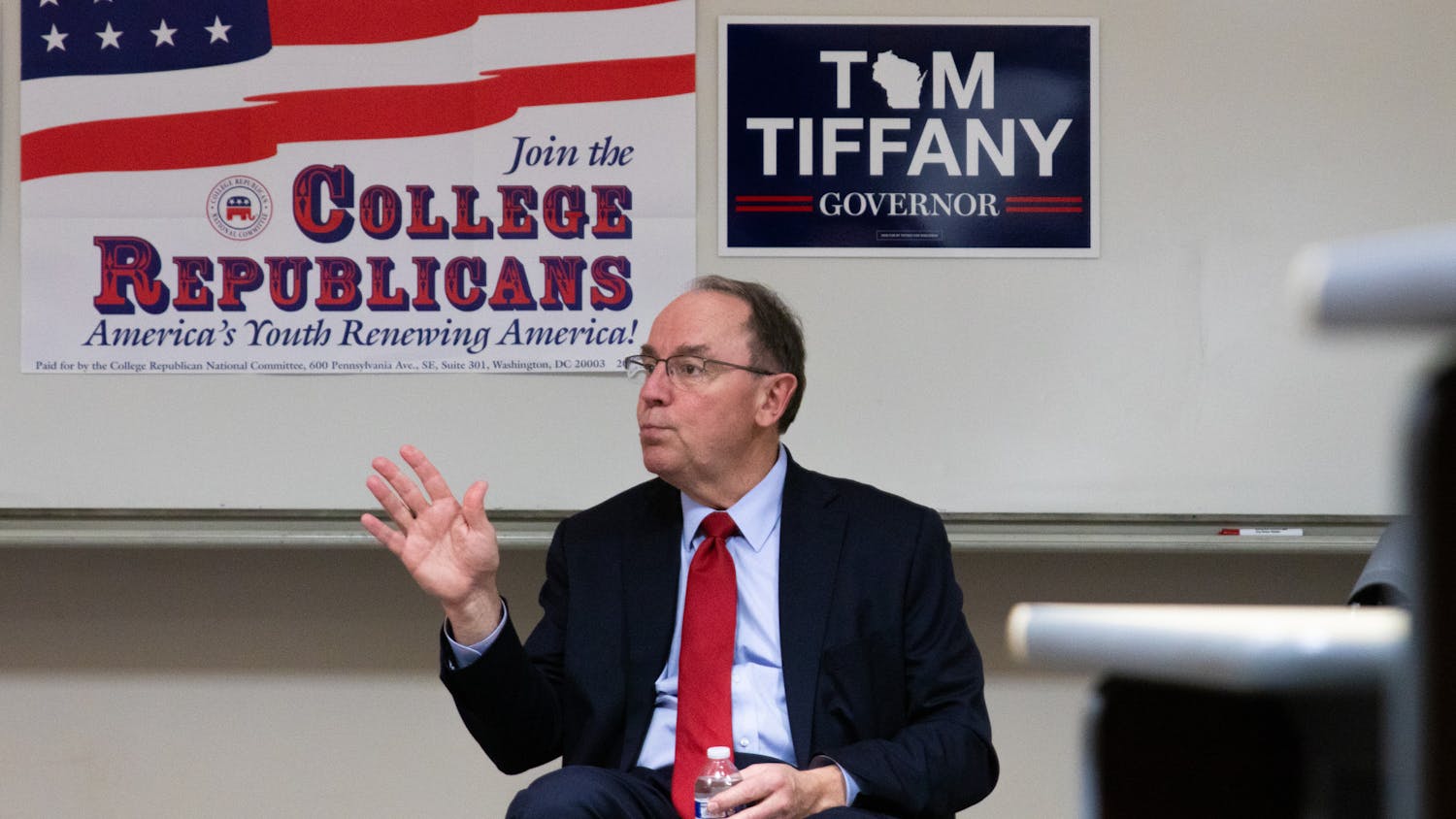On Tuesday, the Student Council of the Associated Students of Madison — the University of Wisconsin-Madison’s student government — convened in person for the first time since the onset of the pandemic.
The past year has been a tumultuous one for the body — much of it spent in gridlock with administrators over their handling of the pandemic, equity and inclusion for students of color and the role of university police on campus. For new ASM chair Adrian Lampron, the new session is a fresh chance for the student voice to be heard and heeded on those issues.
A Minnesota native and a senior studying History and Political Science with a certificate in LGBTQ+ Studies, Lampron is an ASM veteran taking on new responsibility as its leader. The Daily Cardinal sat down with Lampron for a conversation about the state of shared governance on campus, their plans for the year and the music getting them through it.
This conversation has been edited for clarity and brevity.
I'll be honest that coming into UW and for most of my time here, I didn't know very much about ASM — about how it worked, how it affected me as a student. How would you describe the importance of ASM to folks like that?
ASM has two major functions, and one of them is the governing side. We allocate pretty much all of the segregated fees that students pay into things, like the bus pass, funding student organizations, funding UHS, the gyms [and] Recreation and Wellbeing. The other side is grassroots organizing and activism. We work on equity and inclusion issues, sustainability [and] university policy at the state legislature level. We go to meetings with the Dean of Students or meetings with the president of the UW system, trying to advocate for what students need. We’re trying to empower students to use their voice to impact decision making processes.
How would you rate the UW campus’ engagement with those politics?
Good question. I think with ASM directly, the average student is not very involved. We get like 8%, 6% voter turnout depending on the year, which is not great. But I think students engage with the issues ASM works on in many different ways. A lot of work we do intersects with different student organizations or university departments. The Office of Sustainability is doing a lot of the same stuff that our Sustainability Committee is doing, which is the same stuff that CLEAN UW is doing, for example. A lot of people are engaged in some way on the issues of student advocacy, or are aware of the issues we're working on. But not a lot at the ASM level.
I think it's fair to say that last year was contentious, in terms of the relationship between ASM and UW administration. What kind of conversations have you had with the admin going into this year? What does that working relationship look like?
We've been talking a lot to the administrators that we had difficulty working with last year. I think there will still be some of the tensions of last year, just because a lot of the tactics of the administrators were revealed to us, just by how bad stuff got, frankly. So it's kind of hard to go back to feeling like everyone's totally on your side, because it's not that simple. I think that we do have an opportunity to work with administrators more this year, but we'll see.
They made a lot of decisions behind closed doors and without input from shared governance bodies. So if they continue to do that on issues other than COVID this year, that would be really disappointing. I’m hopeful that with the changing circumstances, we'll be able to have a better relationship again.
You said after you were elected last year that one of the things you really wanted to focus on was getting a mental health response program established on campus. Where's that at right now?
So we don't have anything exactly like that on campus yet. At that time last year, UHS was proposing to develop a co-responder model with the University of Wisconsin Police Department. There are folks at UHS who believe they have the capacity to start co-responding, with mental health providers going along with the police to respond to mental health incidents. Over the summer, I was watching to see what was going on at the city level, and it didn't look like it was going to be expanded to campus.
It seems like the best thing we can do right now is support the co-responding model. [This fall,] there will probably be two mental health professionals from UHS co-responding with police officers to mental health emergencies on campus. Eventually, we can move toward a model that's more like what the city is working on with the CARES program, which is just sending a paramedic and mental health first responder to crisis incidents. We don't have that on campus right now, but the city is moving toward it. And I'm hopeful we will move toward it.
What are some of your other priorities for this coming session?
Well, something we've been talking about a lot over the summer is protecting and expanding shared governance. Basically what it comes down to is, we want to make sure that students are in the room when decisions are being made and that we actually have a vote instead of just being an advisory board, which is what happens a lot on campus. So trying to actually have a say in things like the dining meal plan or what kinds of housing options are available to us, or even the segregated fee costs. We want to actually have a say.
Let’s switch gears a little bit. What's your favorite class that you've taken at the UW?
I think my favorite class is still this one I took called Visual History. It was a survey course that focused a lot on European history and art. I'd never taken an art history class before, and I didn't think that it would be very interesting. But the class basically taught me how to look at stuff in history, like artifacts or art, and see beyond what you would just necessarily see. I used to feel like I’d look at an old painting and just think, ‘oh, that's beautiful,’ or ‘that's really weird looking, why is that person wearing such a weird outfit?’ and then move on, and not consider it very deeply. But that class forced the students to look at each piece of the artifact or painting and think about what literally, is that? What does it mean to me, but also what does it mean to the person who made it or to the intended audience?
How’ve you been filling your time outside of ASM and classes? How do you blow off steam?
Well, this summer, I started to learn about foraging and plant identification. So I've been trying to do that while the weather's still nice. I go to the Arboretum or the Lakeshore Nature Trail and Preserve and try to figure out what the plants are around me and if I can snack on them. I haven't had as much time for that lately, because ASM is just so much, but I usually do that. I also play music; I write songs.
Yeah, your music! Did I see that you opened an event for Ilhan Omar recently?
Yeah I did! That's kind of a long time ago now. That was probably like, I think right after the 2020 elections.
Oh, I just saw it on your Twitter relatively high up.
Yeah, I don't tweet that much. (laughs)
I didn't realize you were a musician until I started prepping for this interview. But I noticed that, everywhere I could find a bio of you as an artist, you mention explicitly that your music is about life as a trans person. Are there other artists that you look up to or that respect for their writing on those experiences?
That's a good question. I always really liked Jake Edwards, who's this British singer-songwriter. He wrote the song called Second Puberty that's about transitioning and just trying to grow up as a trans person. That song always hits me. He hasn't put out a lot of new music recently, which is sad. Ryan Cassata is also an awesome trans musician who does a lot of work outside of just music for trans folks. And then what else? I mean, I always have to give a shout out to Sam Smith, who's the best — well, not the best, but the most famous — nonbinary musician. So gotta love them.
I also find community with trans musicians that I know. My friend Bella is a musician and writes and creates this super awesome hyper pop stuff on Soundcloud. Not a lot of people know about or listen to this niche stuff, but it's super cool to just be around people that are really creative. I have a lot of people like that in the trans community here.
What will be on your Spotify wrapped this year?
Probably a lot of The Replacements, which is this old Minneapolis band that I'm very into. I've also been listening to the Mountain Goats a lot. Their album I'm listening to all the time is All Hail West Texas. And probably a lot of Chance the Rapper too. Those are my big ones right now.
Man, All Hail West Texas is an all-time great album. I feel like any possible negative feeling, it can be cathartic for.
Yes! It’s great.
When you think back over your college career, is there anything you would have done differently?
Well there are always student organizations that I see at the org fair or online where I'm like, dang, I should have got involved with that. I think there's just so much cool stuff going on at this university, it's hard to do everything. Maybe one thing I could have done better would be to work on gender inclusive housing here earlier. I just wish I would have had more time to organize around radical queer activism on campus. There are a lot of queer student organizations here, and they do a lot of good community building and education. But I feel like a lot of queer students who are doing activism are doing it in a lot of places. There's not a unified place where students are really pushing for bathroom access, or pronoun usage or education around inclusive classroom education for professors and stuff. Which I think [is] probably because it's just really hard to be a trans student or queer student here. If you're having a hard time already, it's hard to additionally do organizing. And there aren't that many of us. I wish I had time to start a queer student advocacy organization. But I don't have time, so I do that work in other ways.
Anything else that you want to say? What's been on your mind recently?
Well, I know the students who are going to be reading this article will probably already be pretty informed. But I think that it's really important for everybody to know that they can reach out to ASM. And even if we can't directly help you with whatever issue is going on, people at ASM know, like, a lot about this university. Everybody here is getting into really niche conversations about what they're working on. So if you have a problem with a specific engineering department, or a specific sustainability issue in your dorm, somebody in ASM probably knows how to deal with that. People can reach out and we're here to help.






